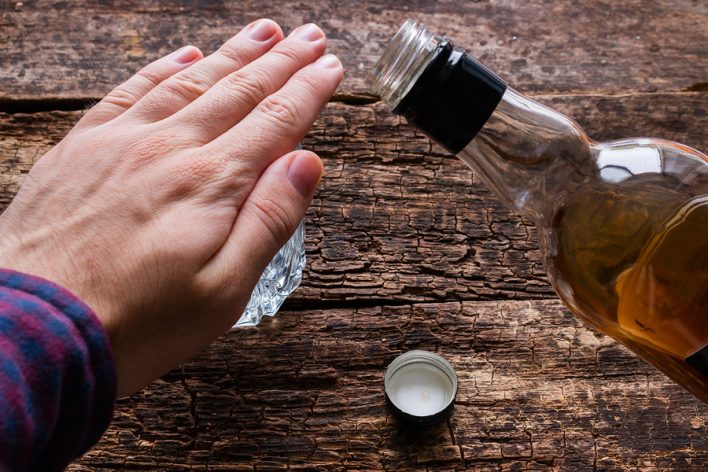Advice
Alcohol and your mental health
By: Cynthia Ebere-Anaba
Updated: 16 March 2017

St. Patrick’s Day, the day where everyone wears green and becomes a little bit Irish.
Whether you call him St. Paddy, St. Pat or Lá Fhéile Pádraig, it doesn’t matter, everyone is welcome to celebrate.
This inclusion is one of the many positive aspects of being Irish, as we are known for being one of the friendliest people in the world. Our communal spirit is very strong and we tend to support each other completely.
While this sense of community can facilitate positive mental health outcomes, over the past few years, St Patrick’s Day is being celebrated by drinking excessive amounts of alcohol. Around 5.5 million pints of Guinness, our most cherished Irish brand are consumed around the world and this number has been found to triple to 13 million on St. Patrick’s Day alone.
According to Alcohol Ireland (2016), alcohol consumption in Ireland almost trebled over four decades between 1960 (4.9 litres) and 2001 (14.3 litres), but is now almost 20% less than this peak in 2001. Although alcohol is consumed, we don’t really pay attention to the effects that alcohol has on both our physical and mental health.
The effects of alcohol on the brain are complicated. Research shows that light alcohol consumption may provide a protective effect on the cardiovascular system and also provide a temporary positive impact on our mood.
However, heavy drinking increases the risk of severe mental illnesses such as depression, suicidality and anxiety among others.
According to the Mental Health Foundation (2006), “The reasons we drink and the consequences of excessive drinking are intimately linked with our mental health”.
Some warning signs that alcohol is affecting your mental health:
- Feeling guilty or ashamed about your drinking.
- Poor sleep after drinking
- Have friends or family members who are worried about your drinking.
- Low mood
- Need to drink in order to relax, forget or feel better.
- Regularly drink more than you intended to.
- Increased anxiety in situations where you would normally feel comfortable
These are things that we need to be aware of this St. Patrick’s Day and every day as the social burden of alcoholism increase in Ireland. Do we need alcohol or can we celebrate Paddy’s day without it?
Ways to stop alcohol impacting your mental health include:
- Know your own limits but also that of your friends.
- Why not swap the booze for exercise or a new hobby?
- Make a plan: Do you really have to drink? Can you manage your habits or do you need a non-drinking buddy to keep you accountable?
- Talk to someone, don’t mask your feelings with alcohol.
- Stay away from homemade remedies that are supposed to help you drink all night.
- If you are anxious after drinking, practise some relaxation and breathing techniques.
So enjoy the Guinness and green outfits, but remember to mind yourselves. Don’t beat yourself up for drinking but ask yourself whether it’s worth it.
This is something we need to be aware of this St. Patrick’s Day and every day as the social burden of alcoholism increase in Ireland. Do we need alcohol or can we celebrate Paddy’s day without it?
Here at MyMind, we are all about mental wellbeing. If you feel like you need to talk to someone about any concerns you have, you can call our team at 076 680 1060 to arrange an appointment, or email us at hq@mymind.org.
By Cynthia Ebere-Anaba
MENTAL HEALTH PROFESSIONALS WORKING WITH Depression ISSUES:
Approach: Person-Centred Therapy , Humanistic & Integrative Psychotherapy , Cognitive Behavioural Therapy (CBT)
Works with: Individual Session
Specialities: Anxiety , Depression , Isolation / Loneliness , Personal Development , Relationship issues , Self Care , Self-Esteem , Stress , Work Issues, Work/Life balance
Next avaialble appointment: 12:00 24 February 2025
Approach: Cognitive Behavioural Therapy (CBT) , Gestalt Therapy , Humanistic & Integrative Psychotherapy , Psychodynamic Therapy , Solution-Focused Brief Therapy , Other , Person-Centred Therapy
Works with: Individual Session
Specialities: Anxiety , Bereavement / Loss , Depression , Domestic Violence / Abuse , Isolation / Loneliness , Personal Development , Relationship issues , Self-Esteem , Sexuality (LGBTQIA+) , Stress , Suicidal Ideation / Self Harm , Work Issues, Work/Life balance , Other
Next avaialble appointment: 12:00 24 February 2025
Approach: Cognitive Behavioural Therapy (CBT)
Works with: Individual Session , Couples
Specialities: Addiction , Anger , Anxiety , Bereavement / Loss , Depression , Personal Development , Relationship issues , Self-Esteem , Stress , Trauma
Next avaialble appointment: 12:00 24 February 2025
NEXT ARTICLE
How to talk to a loved one with an eating disorder
Search
Get The Support You Need
From One Of Our Counselors
News
Isolation
Anxiety
Depression
Relationship Issues
Counselling
Personality Disorder
Addiction
Trauma
Children and Adolescent
Anger
Bereavement
Chronic Illness
Communication Issues
Eating Disorder
Post natal depression
Stress
LGBTQI+
Panic Attack
OCD
Resilience
Parental support
Men's Mental Health
Category List
All Posts
News
Isolation
Anxiety
Depression
Relationship Issues
Counselling
Personality Disorder
Addiction
Trauma
Children and Adolescent
Anger
Bereavement
Chronic Illness
Communication Issues
Eating Disorder
Post natal depression
Stress
LGBTQI+
Panic Attack
OCD
Resilience
Parental support
Men's Mental Health

